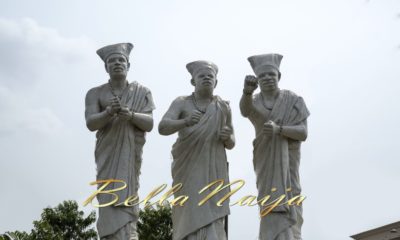Features
Ifeoluwa Odedere: How 90,000 Naira Helped Fuel Lawlessness
 A little over a year ago, the government of Lagos State placed a ban on all forms of hawking on the major roads. The fine, if caught, was N90,000 – this applied to both the buyer and the seller. That was July 2016 to be precise. Now, ninety thousand is a huge sum in any currency and when you compare it with the weight of the offense that the Lagos State Government was attaching to it, the Naira equivalent appears even more insane. It kind of reminds you of Davido’s ‘Tati Billion’.
A little over a year ago, the government of Lagos State placed a ban on all forms of hawking on the major roads. The fine, if caught, was N90,000 – this applied to both the buyer and the seller. That was July 2016 to be precise. Now, ninety thousand is a huge sum in any currency and when you compare it with the weight of the offense that the Lagos State Government was attaching to it, the Naira equivalent appears even more insane. It kind of reminds you of Davido’s ‘Tati Billion’.
In the weeks that followed, I couldn’t but observe with amusement how little the impact of the law was on street hawking. In fact, it appeared to have actually increased their number, with newer items such as pillows added to the mix of offers. What happened to the N90,000 fine?
Well, here’s what happened. Whenever you introduce a punishment that is not commensurate to the severity of the offence, you create conditions for non-compliance – there will be push backs, resistance and the law will be undermined. But this is the government versus street hawkers, so compliance shouldn’t be an issue right?. You couldn’t have been more wrong. Why you ask?
Introducing The Nigerian Police (Force), *drum roll*.
When you leave the enforcement of an unrealistic law in the hands of an organization notorious for extortion, what you get is similar to the hawking scenario.
Here’s how it works: The hawkers by virtue of their earning power cannot pay the N90,000 fine. If caught, the hawkers will most likely face imprisonment, which does nothing to help the financial situation of the policemen (who imprisonment epp?). Therefore it is more convenient for policemen to allow street hawking with one of two options: either the hawkers periodically pay them for ‘license’ to hawk in a particular location or they conduct periodic raids and extort the unlucky ones. From the looks of things, the first option seems to be working more for the policemen.
There you have it: how a law designed to improve law and order can inspire even more lawlessness. Had the fine been set to a lower and more reasonable figure, the chances of compliance might have increased as the incentive for extortion would have been much lower.
This isn’t the first time Lagos State will embark on such clean-up attempts, and it’s obvious it is yet to learn a crucial lesson in governance: you don’t enforce good behavior by passing unreasonable laws.
While waiting for the Lagos State Government to come to terms with the ineffectiveness of its policy, let’s all continue to enjoy the scenery that hawkers in traffic continue to provide.
Photo Credit: © Xiao Cai | Dreamstime



























